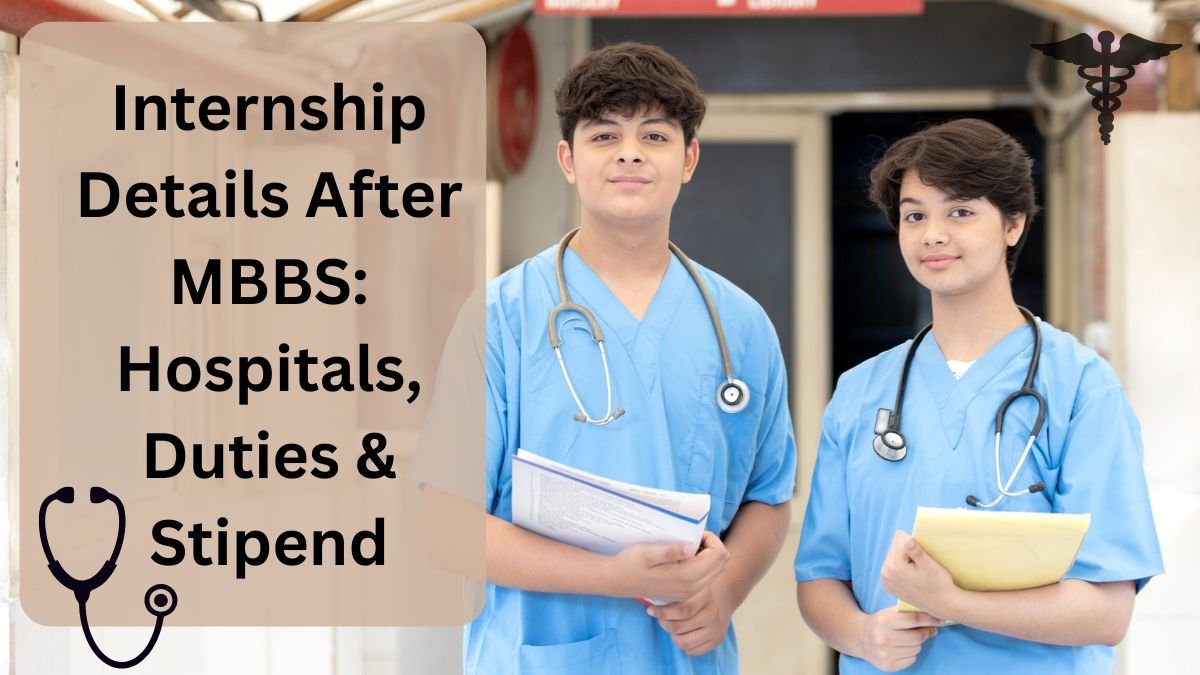The dream of becoming a doctor in India is nurtured in the eyes of millions of students. But this dream cannot be fulfilled by just studying in books. Behind this is hidden long training, countless nights on duty, fatigue and learning in the real world among patients. MBBS internship and postgraduate residency programs are the real steps to realize this dream. Let us know what students experience during internship and residency after completing MBBS in India.
Why is MBBS internship necessary?
The last and most practical stage of MBBS studies is a one-year compulsory internship, called Compulsory Rotatory Medical Internship (CRMI). Without this internship, students can neither get permanent registration nor practice as a doctor in India.
The biggest advantage of this internship is that students work with real patients for the first time, take their history, examine them, be a part of the treatment and learn the work under the guidance of experienced doctors. Moreover, this experience helps them decide which branch they want to specialize in next — medicine, surgery, gynaecology, or any other field.
Internship Structure and Routine
The MBBS internship is of 12 months in which students have to work in rotational capacity in different departments. These departments are:
- Medicine – 2 months
- Surgery (including anaesthesia) – 2 months
- Gynaecology – 1 month
- Paediatrics – 1 month
- Orthopaedics – 1 month
- Community Medicine – 2 months
- Emergency Medicine – 2 months
- Ophthalmology – 15 days
- ENT (Ear, Nose, Throat) – 15 days
- Department of student’s choice – 15 days
Every day the intern starts at 6:30 am and after reaching the hospital, rounds start from 7:30 to 8 am. During rounds, senior doctors discuss cases and interns have to report the patients’ condition. After this, the busy day begins.
Daily Experience During Internship
Clinical Responsibilities
Interns have to learn to take blood samples from patients, insert IVs, administer medications, maintain records, assist in surgery, and sometimes even stitch.
Administrative Tasks
Interns have to update patient case sheets, write discharge summaries, fill test request forms and take consent from patients before surgery.
Emotional Challenges
During internship, students see patient death for the first time, learn to work under stressful situations and become mentally strong as a doctor.
Internship Stipend (Salary)
During internship, students are also given a monthly stipend which depends on the college:
- College Type Stipend Range
- Government Medical College ₹20,000 – ₹30,000
- Private Medical College ₹15,000 – ₹25,000
- Deemed University ₹10,000 – ₹20,000
What is a Post-Graduate Residency Program?
After MBBS, if a student wants to become a specialist, he has to take admission in MD, MS or DNB program by taking NEET PG exam. This residency program is of three years in which students study and train in depth in the respective specialization.

Residency has two phases:
- Junior Resident – During MD/MS/DNB
- Senior Resident – Up to 3 years after MD/MS
Daily Experience During Residency
The life of a resident doctor is very hectic and challenging:
- Reaching the hospital before 7 am
- Taking case histories and testing patients
- Long 12–14 hour shifts
- At least one 24-hour duty a week
- Interacting with patients and their families
- Making case notes and medical records
- Participating in academic seminars, journal clubs, thesis, and case presentations
- Residency not only gives technical knowledge to the students but also develops decision-making ability, tolerance, and confidence.
Residency Salary
Resident doctors receive higher salaries than interns, especially in government colleges.
Government College Salary:
Position Monthly Salary
Monthly emoluments of PG students differ depending on their respective ranks. Junior residents receive 100,000 to 110,000 as monthly emoluments while senior residents are rewarded with up to 120,000-130,000.
Private College Salary:
Position Monthly Salary
Junior Resident ₹0 – ₹60,000
Senior Resident ₹0 – ₹70,150
Note: Many private colleges even today pay either nominal salary or nothing to the resident doctors.
Conclusion
MBBS internship and residency are two important stages in the journey of becoming a doctor. While internship helps students gain basic skills by meeting real patients, residency prepares them as a specialist doctor. Both the stages are tough, stressful and demanding, but also essential for building a true doctor. If you want to become a doctor in India, then this journey will take your personality, skills and patience to a new height.
FAQs
1. What is the duration of the internship after MBBS in India?
A. The internship, officially called the Compulsory Rotating Medical Internship (CRMI), lasts for 12 months. It is mandatory for MBBS graduates before they receive their permanent medical registration.
2. Is the MBBS internship compulsory for all medical students?
A. Yes, it is compulsory. Without completing the internship, an MBBS graduate cannot register with the State Medical Council or the National Medical Commission (NMC) and is not legally allowed to practice medicine.
3. Are MBBS internships available in private hospitals?
A. Usually, interns complete their training in the same medical college hospitals where they studied MBBS. In some cases, NMC-approved private hospitals may be used for rotations, especially for community or rural postings.
4. Can foreign medical graduates (FMGs) do internships in India?
A. Yes, but they must first clear the Foreign Medical Graduate Examination (FMGE). After that, they are eligible to apply for one-year internship in approved medical colleges/hospitals in India.
5. Are night shifts and emergency duties part of the MBBS internship?
A. Yes. Interns are often required to do night duties, weekend shifts, and work in emergency and casualty departments, sometimes even 24-hour shifts under supervision.
